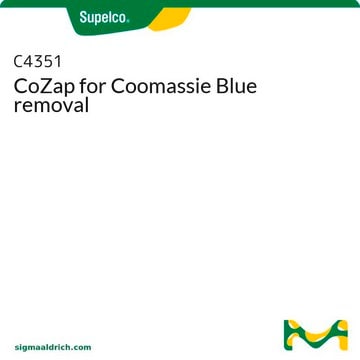B8647
Brilliant Blue R Concentrate
methanol solution
Synonym(s):
Brilliant Blue R, Acid Blue 83, Brilliant indocyanin 6B, Coomassie Brilliant Blue R
About This Item
Recommended Products
product name
Brilliant Blue R Concentrate, suitable for SDS-PAGE, methanol solution
form
methanol solution
Quality Level
color
dark blue
suitability
suitable for SDS-PAGE
application(s)
diagnostic assay manufacturing
hematology
histology
storage temp.
room temp
SMILES string
[Na+].CCOc1ccc(Nc2ccc(cc2)C(\c3ccc(cc3)N(CC)Cc4cccc(c4)S([O-])(=O)=O)=C5\C=C/C(C=C5)=[N+](\CC)Cc6cccc(c6)S([O-])(=O)=O)cc1
InChI
1S/C45H45N3O7S2.Na/c1-4-47(31-33-9-7-11-43(29-33)56(49,50)51)40-23-15-36(16-24-40)45(35-13-19-38(20-14-35)46-39-21-27-42(28-22-39)55-6-3)37-17-25-41(26-18-37)48(5-2)32-34-10-8-12-44(30-34)57(52,53)54;/h7-30H,4-6,31-32H2,1-3H3,(H2,49,50,51,52,53,54);/q;+1/p-1
InChI key
NKLPQNGYXWVELD-UHFFFAOYSA-M
Looking for similar products? Visit Product Comparison Guide
Application
Brilliant Blue R Concentrate has been used for protein band detection after nondenaturing gradient gel electrophoresis, isoelectric focussing and SDS-PAGE (sodium dodecyl sulfate polyacrylamide gel electrophoresis).
Reconstitution
Legal Information
related product
Signal Word
Danger
Hazard Statements
Precautionary Statements
Hazard Classifications
Acute Tox. 3 Dermal - Acute Tox. 3 Inhalation - Acute Tox. 3 Oral - Eye Irrit. 2 - Flam. Liq. 2 - Skin Irrit. 2 - STOT SE 1
Target Organs
Eyes,Central nervous system
Storage Class Code
3 - Flammable liquids
WGK
WGK 3
Flash Point(F)
57.2 °F - closed cup
Flash Point(C)
14 °C - closed cup
Personal Protective Equipment
Choose from one of the most recent versions:
Certificates of Analysis (COA)
Don't see the Right Version?
If you require a particular version, you can look up a specific certificate by the Lot or Batch number.
Already Own This Product?
Find documentation for the products that you have recently purchased in the Document Library.
Customers Also Viewed
Articles
Explore the impact of water quality on protein electrophoresis and Western blotting. Learn about the role of ultrapure water and its effect on chemiluminescent signals in Western blotting.
Explore the impact of water quality on protein electrophoresis and Western blotting. Learn about the role of ultrapure water and its effect on chemiluminescent signals in Western blotting.
Explore the impact of water quality on protein electrophoresis and Western blotting. Learn about the role of ultrapure water and its effect on chemiluminescent signals in Western blotting.
Explore the impact of water quality on protein electrophoresis and Western blotting. Learn about the role of ultrapure water and its effect on chemiluminescent signals in Western blotting.
Our team of scientists has experience in all areas of research including Life Science, Material Science, Chemical Synthesis, Chromatography, Analytical and many others.
Contact Technical Service









